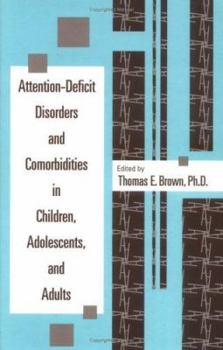Attention-Deficit Disorders and Comorbidities in Children, Adolescents, and Adults
This work covers topics such as emerging understandings of ADDs and comorbidities, genetic research on ADDs and comorbidities, pharmacotherapy for ADDs and comorbodities and educational interventions for students with ADDs.
Format:Hardcover
Language:English
ISBN:0880487119
ISBN13:9780880487115
Release Date:March 2000
Publisher:American Psychiatric Publishing
Length:671 Pages
Weight:2.35 lbs.
Dimensions:1.6" x 6.2" x 9.3"
Customer Reviews
1 rating
I give it 5 stars just for Chapter 18 alone
Published by Thriftbooks.com User , 23 years ago
Actually, I only read chapter 18, by Stephen Mcdermott. He describes the struggle of having ADHD so dead on, I had a catharsis. Mcdermott does a case study of a fellow named Jack as he goes through high-school and college. Jack notices that he has to study much harder than his peers, and uses such specific information about specific aspects of himself to make generalizations about himself as a person.My only problem with this chapter is that it wasn't copyedited well (does anyone know how to get in touch with Thomas Brown or American Psychiatric Press?)On the last line of page 584 it reads: "The agenda can prevent the therapy from becoming focused on a "crisis du jour," whereby therapists deal only with the crises and catastrophes that patients bring into the session to-week continuity they need to solidly acquire a set of skills."Then a little further down before and after page 587: To set the stage for other techniques to work, the activation of the beliefs attention needs to be interrupted in order to decrease the stimulation of the activated belief. Even with these two glaring errors, the chapter is still worth it. I remain anonymous because I have been fired twice for having ADHD (If you don't know that the Americans with Disabilites Act is a big joke, then you haven't been paying attention (no pun intended)).





